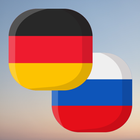Haolingxiazai provides the latest software downloads for Немецко-Русский офлайн словарь games.


Немецко-Русский офлайн словарь
| App Name | Немецко-Русский офлайн словарь |
|---|---|
| Genre | Libraries&Demo |
| Size | 32.6 MB |
| Latest Version | 20 |
| MOD Info | Premium Unlocked |
| Get it On |

|
German-Russian and Russian-German offline dictionary (Deutsch-Russische Wörterbuch)
German-Russian and Russian-German offline dictionary (Deutsch-Russische Wörterbuch, Russian-German Dictionary)
- No internet connection needed.
- Sample translation of sentences
- Adding bookmarks to the dictionary
What's New in the Latest Version 20.0
Last updated on Jun 10, 2024
В новой версии добавлены улучшения в дизайне и сделаны небольшие исправления
Content
Немецко-Русский офлайн словарь, or German-Russian Offline Dictionary, is a digital lexicon designed for use without an internet connection. This fundamental feature allows users to access translations between German and Russian anytime, anywhere, regardless of internet availability. This is particularly useful for travelers in areas with limited or no connectivity, students studying offline, or anyone who prefers the reliability and speed of a local resource. Offline dictionaries generally offer quicker access to word definitions compared to online versions, as they don't rely on network speeds or server availability.
The core functionality of Немецко-Русский офлайн словарь revolves around providing translations for German and Russian words. Users can input a word in either language and receive its equivalent in the other. The dictionary likely includes a vast database of words, covering a wide range of vocabulary, from everyday terms to more specialized terminology. The extent of the vocabulary depends on the specific dictionary app, with some offering more comprehensive coverage than others. Ideally, a robust offline dictionary includes not just direct translations, but also grammatical information, such as parts of speech, gender, and case for nouns, as well as verb conjugations.
Beyond simple word-for-word translations, a good German-Russian offline dictionary should also provide contextual information. This could include example sentences demonstrating the usage of a word in different contexts, idiomatic expressions, and common collocations. Such contextual information is crucial for understanding the nuances of language and avoiding literal translations that may be inaccurate or nonsensical. The inclusion of pronunciation guides, either through audio clips or phonetic transcriptions, further enhances the learning experience and aids in accurate pronunciation.
The user interface of a well-designed offline dictionary should be intuitive and easy to navigate. A simple search function allows users to quickly locate the desired word. Features like history tracking, allowing users to revisit previously searched words, and bookmarking functionality for saving important vocabulary, further enhance usability. The ability to adjust font sizes and choose different color schemes can also improve the reading experience, particularly for users with visual impairments.
The offline nature of the dictionary implies that the entire database is stored locally on the user's device. This necessitates a certain amount of storage space, depending on the size of the vocabulary and the inclusion of multimedia content like audio pronunciations. Users should consider the storage requirements before downloading the dictionary, especially on devices with limited storage capacity. Regular updates are also important to ensure the dictionary stays current with evolving language usage and incorporates new vocabulary.
The benefits of using a German-Russian offline dictionary extend beyond simple translation. It can serve as a valuable learning tool for students of either language. The offline accessibility allows for consistent practice and vocabulary building without relying on internet access. The inclusion of example sentences and contextual information helps learners understand the practical application of words and phrases. Furthermore, the ability to quickly look up unfamiliar words while reading or listening to German or Russian content enhances comprehension and facilitates language acquisition.
For travelers, a German-Russian offline dictionary is an indispensable tool for communication. It can help overcome language barriers in situations where internet access is unavailable or unreliable. From ordering food in a restaurant to asking for directions, the dictionary can facilitate basic communication and enhance the travel experience. It also provides a sense of independence and confidence, allowing travelers to navigate unfamiliar situations without relying on others for translation.
In conclusion, Немецко-Русский офлайн словарь is a valuable resource for anyone needing to translate between German and Russian without an internet connection. Its utility extends from students and language learners to travelers and professionals. The key features to look for in a good offline dictionary include a comprehensive vocabulary, contextual information, an intuitive user interface, and regular updates. By choosing a well-designed offline dictionary, users can gain access to a reliable and efficient translation tool that empowers them to communicate effectively and learn languages independently, regardless of their location or internet connectivity.











